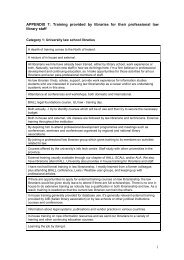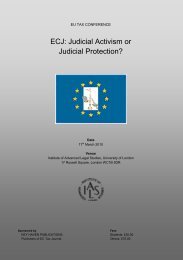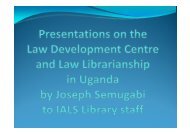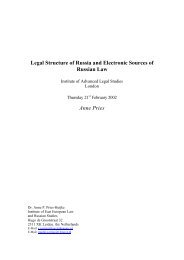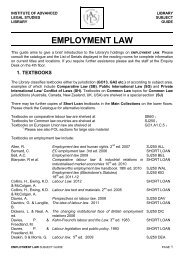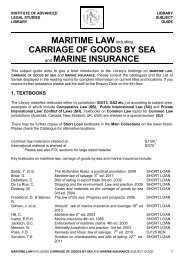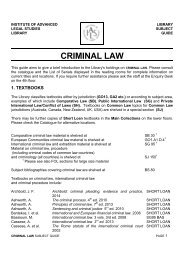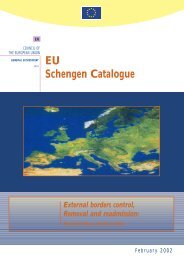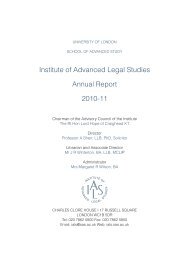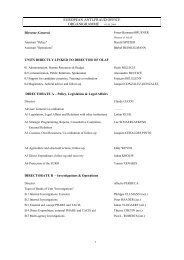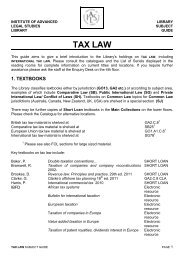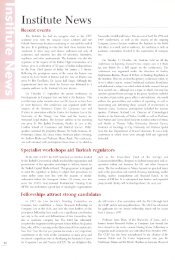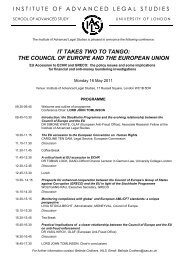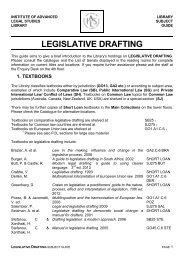a thesis - Institute of Advanced Legal Studies
a thesis - Institute of Advanced Legal Studies
a thesis - Institute of Advanced Legal Studies
Create successful ePaper yourself
Turn your PDF publications into a flip-book with our unique Google optimized e-Paper software.
INVALIDATING CAUSES. 87<br />
Immoral Trusts.—A trust against public morality is likewise<br />
unenforceable. It is for this reason that a trust for illegitimate<br />
children thereafter to be born has been said to be void; though a<br />
trust for illegitimate children in esse or en venire sa mere at the date<br />
<strong>of</strong> the instrument creating the trust is valid, and it may be that<br />
the trust is valid in favour <strong>of</strong> all illegitimate children born before<br />
the instrument comes into operation. This was the decision <strong>of</strong> the<br />
majority <strong>of</strong> the Court <strong>of</strong> Appeal in Occleston v. Fullalove (1874,<br />
L. E. 9 Ch. App. 147), though Lord Selborne dissented. In discussing<br />
the rule that future illegitimate children cannot take under<br />
a trust, Lord Justice James in that case (p. 160) says: " If the<br />
expression ' future children' be limited to what I conceive to be its<br />
more accurate meaning—children to come into existence after the will<br />
itself has really come into existence as the last will <strong>of</strong> the testator,<br />
viz., after his death—then I would at once, for reasons subsequently<br />
given, concede that there is or may be such a rule <strong>of</strong> law<br />
as that referred to. But if it be extended to apply to children<br />
coming into existence between the date or execution <strong>of</strong> the will<br />
and the death <strong>of</strong> the testator, then, in my humble judgment, the<br />
proposition is not one to be assumed as it appears to have been."<br />
.... Lord Justice Mellish, in the same case, draws a distinction<br />
between a trust for future illegitimate children in a deed and one in<br />
a will on the ground that the former operates from the date <strong>of</strong> its<br />
execution, the latter from the death <strong>of</strong> the testator. He granted<br />
that in the former case the gift is void as tending to immorality<br />
(p. 171), but held that in the latter it is good as regards children<br />
born or en ventre sa mere before the testator's death, although after<br />
the date <strong>of</strong> the will. It seems clear that a trust cannot be<br />
effectively made in favour <strong>of</strong> illegitimate children to be born after<br />
the date when the will comes into operation, namely, the death <strong>of</strong><br />
the testator.<br />
Trusts against Public Policy.—Finally, any trust the purpose <strong>of</strong><br />
which is contrary to public policy is void. The leading case 011<br />
this subject is Egerton v. Earl Broicnloiv (1853, 4 II. L. C. 1).<br />
The case arose upon the will <strong>of</strong> the seventh Earl <strong>of</strong> Bridgewater,<br />
who devised very large real estates to trustees to make a settlement<br />
according to the limitations stated in the will. One <strong>of</strong> these was<br />
to Lord Alford for the term <strong>of</strong> ninety-nine years, if he should so<br />
long live ; remainder to trustees to preserve contingent remainders ;<br />
remainder to the use <strong>of</strong> the heirs male <strong>of</strong> his body, with remainder



